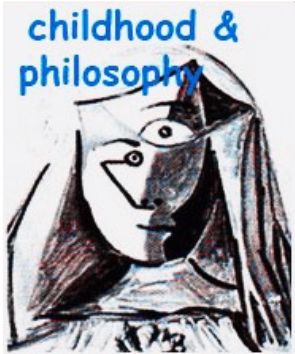the paratexts of cpi: emergent findings of an inquiry in iran
DOI:
https://doi.org/10.12957/childphilo.2023.70511Keywords:
p4c, community of philosophical inquiry (cpi), paratext, facilitator's roles and positions.Abstract
This article presents the emergent findings of research conducted in Iran. It’s main objective was to investigate whether adolescents' thinking could turn polyphonic in CPI and what processes, thinking would go through to achieve this objective. Seventeen adolescents, ten girls, and seven boys participated in fourteen sessions with three iranian and three foreign novels as the materials of inquiry. The sessions were videotaped and analyzed by the researchers. The findings discovered out of pre-determined objectives revealed that CPI was effective in developing adolescents' polyphonic thinking, and polyphonic thinking processes at work were also revealed. At the same time, some unexpected data emerged which gave rise to some emergent findings, among which was that meaning-making is not limited to what happens “inside” the CPI, but some events before, after, and during the sessions are decisive in meaning-making within this communal circle and formation of CPI. We named them ‘paratexts’ of CPI that included WhatsApp chats, religious, educational, scientific, and gender discourses, the extension of issues discussed at CPI to school and home, adolescent dialogues before and after the sessions, and their reading of philosophical ideas and literary commentaries on the materials of inquiry. Gérard Genette, giving currency to the term ‘paratext’, conceives of it as an undefined zone between the inside and the outside of a printed work that forms the complex mediation between book, author, publisher, and reader. It is a border zone in which text and off-text enter dialogue the paratexts associated with CPI directed us to reconfigure the practice in reconsideration of the facilitator’s roles and positions. On this account, the facilitator is someone who needs to be able to actively listen both to the voices of the group members and the voices of existing paratexts, and to manoeuvre between multiple roles and positions as the situation demands.
References
Bakhtin, M. M. (1984). Problems of Dostoevsky’s poetics. Ed and Trans C. Emerson. Minneapolis: University of Minnesota Press.
Eisner, E.W. (1979). The educational imagination: on the design and evaluation of school programs. New York: Macmillan Publishing Co, Inc.
Eisner, E.W. (2005). Reimagining Schools: the selected works of Elliot W. Eisner. London: Routledge.
Genette, G. (1997). Paratexts: thresholds of interpretation. Translated by Jane E. Lewin.
Hunt, P. (1991). Criticism, theory and children's literature. Oxford: Blackwell.
Kennedy, N. S., & Kennedy, D. (2011). Community of philosophical inquiry as a discursive structure, and its role in school curriculum design. Journal of the Philosophy of Education, 45 (2), 265-284.
Khosronejad, M. (2011). Intellectual stories: a collection of ten picturebooks. Mashhad: Behnashr. (in Persian).
Khosronejad. M. (in press). The answers are blowing in the wind. In M. Khosronejad & L. Atashi (Eds). The answers are blowing in the wind, foundations of philosophy with children. Tehran: Kargadan Publisher (In Persian).
Matusov, E. (2009). Journey into dialogic pedagogy. New York: Nova Science Publishers, Inc
Ministry of Education; Supreme Council of Cultural Revolution; & Supreme Council of Education. (2011). Fundamental Reform Document of Education (FRDE): Mashhad.
Shokrollahzadeh, S. (2018). Realization of polyphonic processes in the community of philosophical inquiry for adolescents (P4A) and the implications of the theory of polyphony for this community [unpublished doctoral dissertation]. Shiraz University.
Stephens, J. (2010). Paratext. In D. Rudd (Ed). The Routledge companion to children's literature (pp 222-223). LONDON AND NEW YPRK: Routledge.




